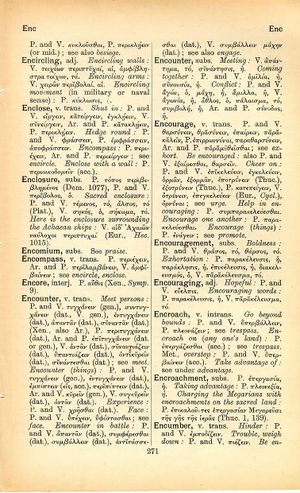encroachment: Difference between revisions
From LSJ
Ὁ δὲ μὴ δυνάμενος κοινωνεῖν ἢ μηδὲν δεόμενος δι' αὐτάρκειαν οὐθὲν μέρος πόλεως, ὥστε ἢ θηρίον ἢ θεός → Whoever is incapable of associating, or has no need to because of self-sufficiency, is no part of a state; so he is either a beast or a god
(CSV4) |
m (Woodhouse1 replacement) |
||
| Line 1: | Line 1: | ||
{{Woodhouse1 | {{Woodhouse1 | ||
|Text=[[File:woodhouse_271.jpg|thumb|link={{filepath:woodhouse_271.jpg}}]] | |Text=[[File:woodhouse_271.jpg|thumb|link={{filepath:woodhouse_271.jpg}}]] | ||
P. [[ἐπεργασία]], ἡ. | ===substantive=== | ||
[[prose|P.]] [[ἐπεργασία]], ἡ. | |||
[[taking advantage]]: [[prose|P.]] [[πλεονεξία]], ἡ. | |||
[[charging the Megarians with encroachments on the sacred land]]: [[prose|P.]] [[ἐπικαλοῦντες ἐπεργασίαν Μεγαρεῦσι τῆς γῆς τῆς ἱερᾶς]] ([[Thucydides|Thuc.]] 1, 139). | |||
}} | }} | ||
Revision as of 08:56, 20 May 2020
English > Greek (Woodhouse)
substantive
taking advantage: P. πλεονεξία, ἡ.
charging the Megarians with encroachments on the sacred land: P. ἐπικαλοῦντες ἐπεργασίαν Μεγαρεῦσι τῆς γῆς τῆς ἱερᾶς (Thuc. 1, 139).

